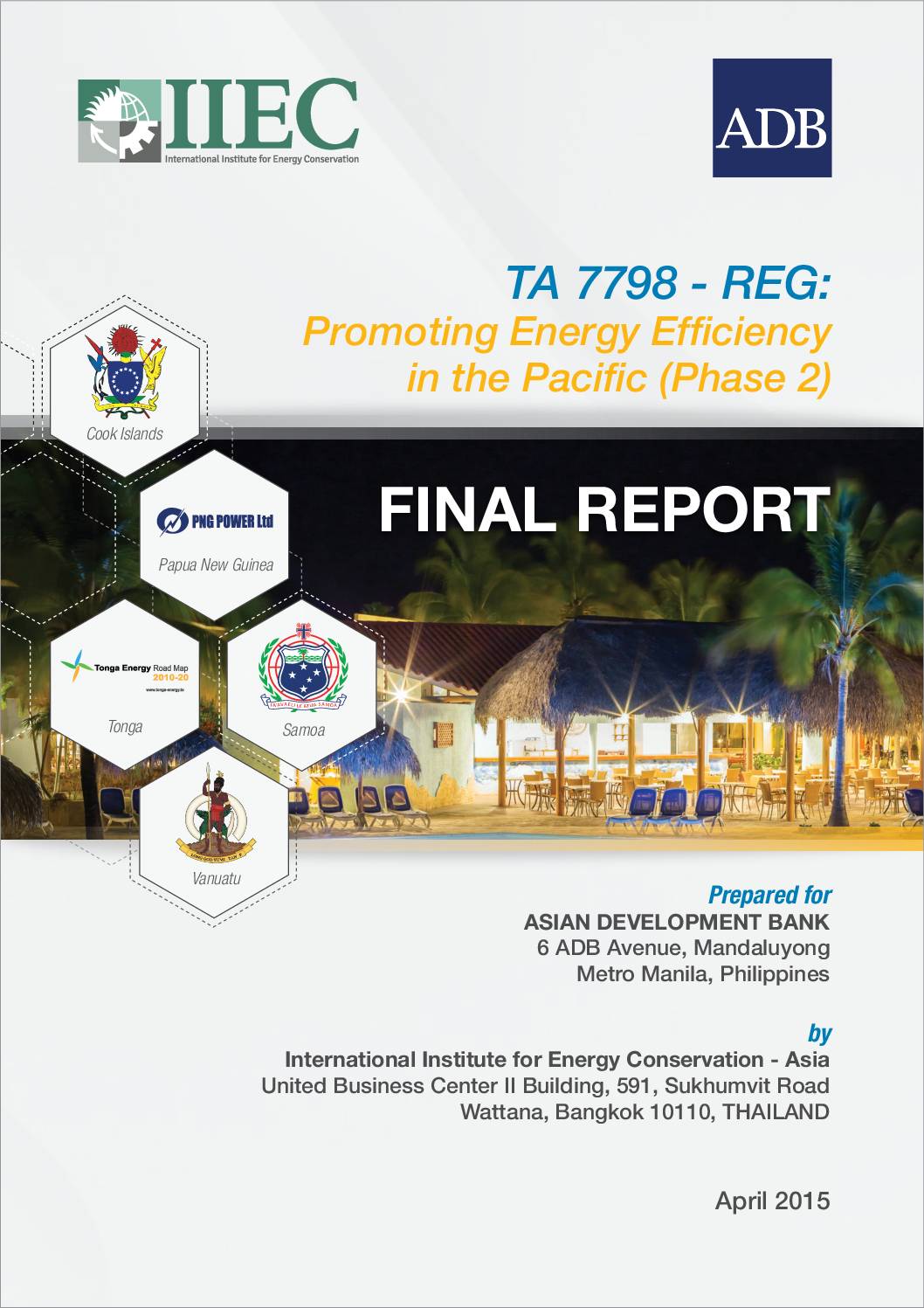The Asian Development Bank (ADB) approved a regional Technical Assistance (RETA) for Promoting Energy
Efficiency in the Pacific (PEEP) in September 2008 to be implemented in two phases. Phase 1, which
concluded in May 2011, focused on conducting pilot programmes and identifying some energy efficiency
projects for funding or co-financing by ADB, GEF and other sources. Phase 2 (PEEP2) focused on establishing
the policy and implementation frameworks and energy efficiency targets and implementation of Energy
Efficiency (EE) measures in the 5 participating PDMCs (PNG, Vanuatu, Tonga, Samoa and the Cook Islands) in
order to contribute to achieving the overall goal reducing energy consumption in the residential, commercial
and public sectors.
The key achievements of PEEP2 include the following:
• Development of an energy use database to provide access to information on electricity consumption and
energy efficiency indicators at national and end-use sector levels. The database system was designed
focusing primarily on the major end-use sectors (commercial and public sector buildings; residential
sector, and street lighting); and is capable of accommodating expansion to include additional end-use
sectors and countries in the future. The database was designed as a web-based system and is capable of
operating in an “off-line” mode with all the core system components based on open source technologies.
• The information on end-use consumption and energy efficiency indicators was used to support design,
implementation and monitoring of various project activities under PEEP2.
• Development of national EE targets for the five PDMCs based on a set of energy and economic parameters
that influence projections of energy consumption and end-use energy savings. Projections were made for
three policy scenarios – conservative, moderate and aggressive – for the years 2020, 2025 and 2030.
• To improve EE best practices, several complementary activities were undertaken including: Energy
Efficiency Technology Assessment, International Best Practices for Energy Efficiency Building Codes, Green
Hotels Rating Scheme for the Pacific, Green Commercial Buildings Rating Scheme for the Pacific; and
Energy Efficiency Assessment Guidelines, Framework and Scorecard.
• Comprehensive energy audit training was conducted in all five PDMCs. The training program included four
modules – Basic and Intermediate energy auditing (Modules 1 and 2) and Intermediate and Advanced
energy auditing (Modules 3 and 4), practical on-site training and preparation of Investment Grade Audit
Reports.
• A total of 35 EE projects were designed and 34 projects implemented following ADB procurement
guidelines. The total investment (ADB component) was US$ 1,912,481 resulting in energy annual savings
of 3,411 MWh, annual cost savings of $1,458,922 and CO2 savings of 3,204 tons/year. The average cost of
saved energy across these projects, for example in Samoa was 6 US cents/kWh. This compare very
favorably with the electricity tariffs in the PDMCs that range between 29 and 61 US cents/kWh, thereby
demonstrating the economic attractiveness of EE measures.
• A series of “Energy Saving” tips for printing on the back of electricity bills were prepared and provided to
the utilities. Also, “Home Energy Guides” providing information on electricity costs for common electrical
appliances (both efficient and inefficient) customized to each PDMC and energy saving tips for each
electrical appliance were printed and distributed.
PEEP2 has established several guidelines, templates and implementation models that would be suitable for
scaling up EE implementation throughout the Pacific region.
Share this

Sectors: Buildings, Cross cutting, Equipment and appliances, Industry, Power sector, Transport
Country / Region: Cameroon, Cook Islands, Oceania, Papua New Guinea, Samoa, Tonga, Vanuatu
Tags: assessment of the status quo, auditing, best practice, building types, corporate reporting, efficiency indicators, electricity generation, energy, energy efficiency, final reports, Global Environment Fund, implementation, international development, projects, rail transport, targets, trainsKnowledge Object: Publication / Report
Published by: Asian Development Bank
Publishing year: 2015
Author: IIEC
